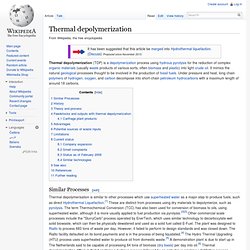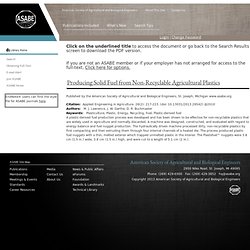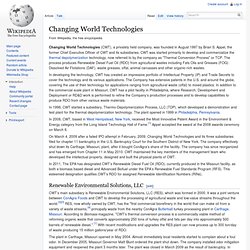

Falls business turns plastic into fuel WIVB.com.mov Wiki - thermal depolymerization. Thermal depolymerization (TDP) is a depolymerization process using hydrous pyrolysis for the reduction of complex organic materials (usually waste products of various sorts, often biomass and plastic) into light crude oil.

It mimics the natural geological processes thought to be involved in the production of fossil fuels. Under pressure and heat, long chain polymers of hydrogen, oxygen, and carbon decompose into short-chain petroleum hydrocarbons with a maximum length of around 18 carbons. Similar Processes[edit] Thermal depolymerisation is similar to other processes which use superheated water as a major step to produce fuels, such as direct Hydrothermal Liquefaction.[1] These are distinct from processes using dry materials to depolymerize, such as pyrolysis. History[edit] Thermal depolymerization is similar to the geological processes that produced the fossil fuels used today, except that the technological process occurs in a timeframe measured in hours. Theory and process[edit] Plastic2Oil. Changing World Technologies, Inc. Letter I wrote Brian Appel Chairman and CEO Changing World Technologies CWT. Thermal Depolymerization notes. Paul Baskis. Paul Baskis is an Illinois biochemist, who, in the 1980s found a way of synthetically producing oil from industrial and household wastes without expending more energy than is produced.

This process was patented, U.S. patent 5,269,947,[1] in 1993. The rights to the patent were acquired by Changing World Technologies. See also[edit] References[edit] Thermal depolymerization. Producing solid fuel from non-recyclable agricultural plastics. Click on the underlined title to access the document or go back to the Search Results screen to download the PDF version.

If you are not an ASABE member or if your employer has not arranged for access to the full-text, Click here for options. Published by the American Society of Agricultural and Biological Engineers, St. Joseph, Michigan www.asabe.org Citation: Applied Engineering in Agriculture. 26(2): 217-223. (doi: 10.13031/2013.29542) @2010 Authors: M. A plastic-derived fuel production process was developed and has been shown to be effective for non-recyclable plastics that are widely used in agriculture and normally discarded. Free Energy!! The $400 Billion Dollar Secret. Changing World Technologies. Changing World Technologies (CWT), a privately held company, was founded in August 1997 by Brian S.

Appel, the former Chief Executive Officer of CWT and its subsidiaries. CWT was started primarily to develop and commercialize the thermal depolymerization technology, now referred to by the company as "Thermal Conversion Process" or TCP. The process produces Renewable Diesel Fuel Oil (RDO) from agricultural wastes including Fats Oils and Greases (FOG) Dissolved Air Flotations (DAF), waste greases, offal, animal carcasses and other organic-rich wastes. In developing the technology, CWT has created an impressive portfolio of Intellectual Property (IP) and Trade Secrets to cover the technology and its various applications. The Company has extensive patents in the U.S. and around the globe, covering the use of their technology for applications ranging from agricultural waste (offal) to mixed plastics. Renewable Environmental Solutions, LLC[edit] In December of 2012 noted engineer Dennis M.